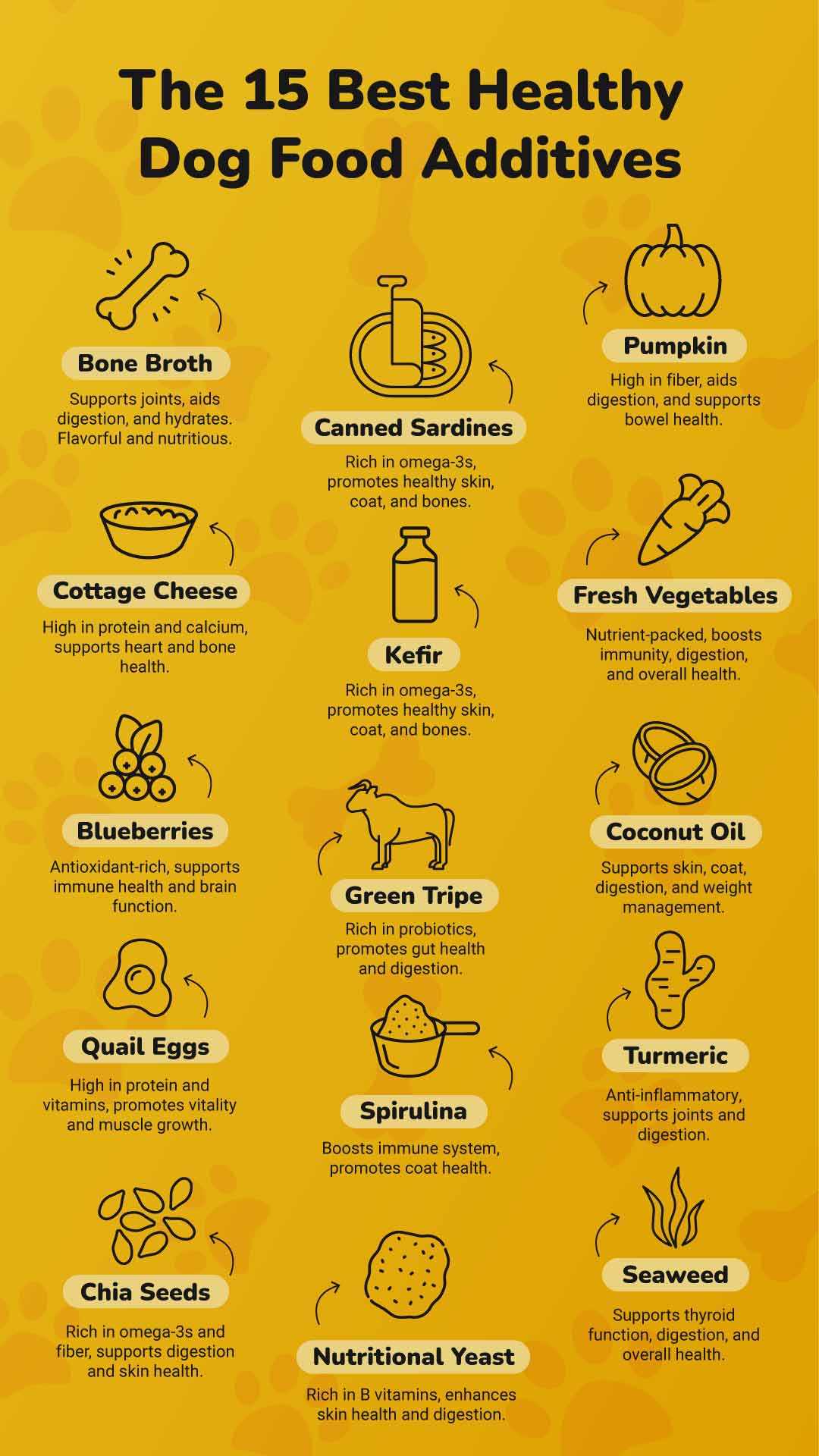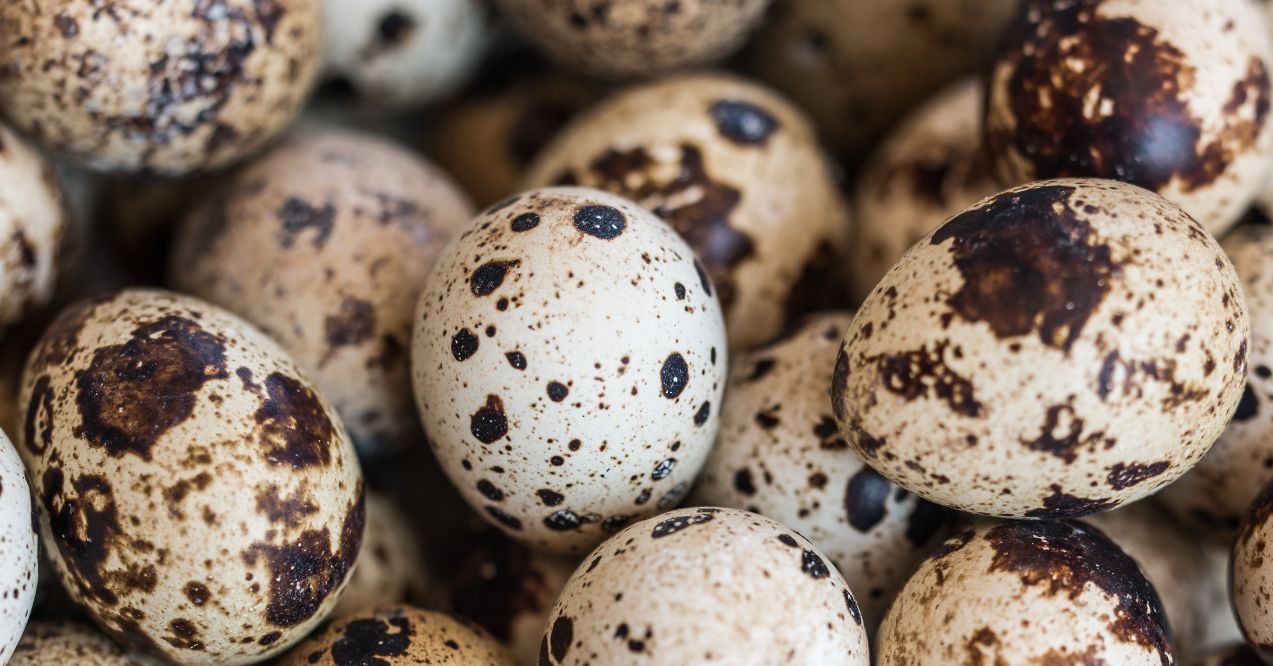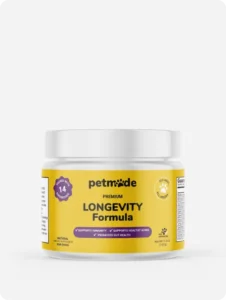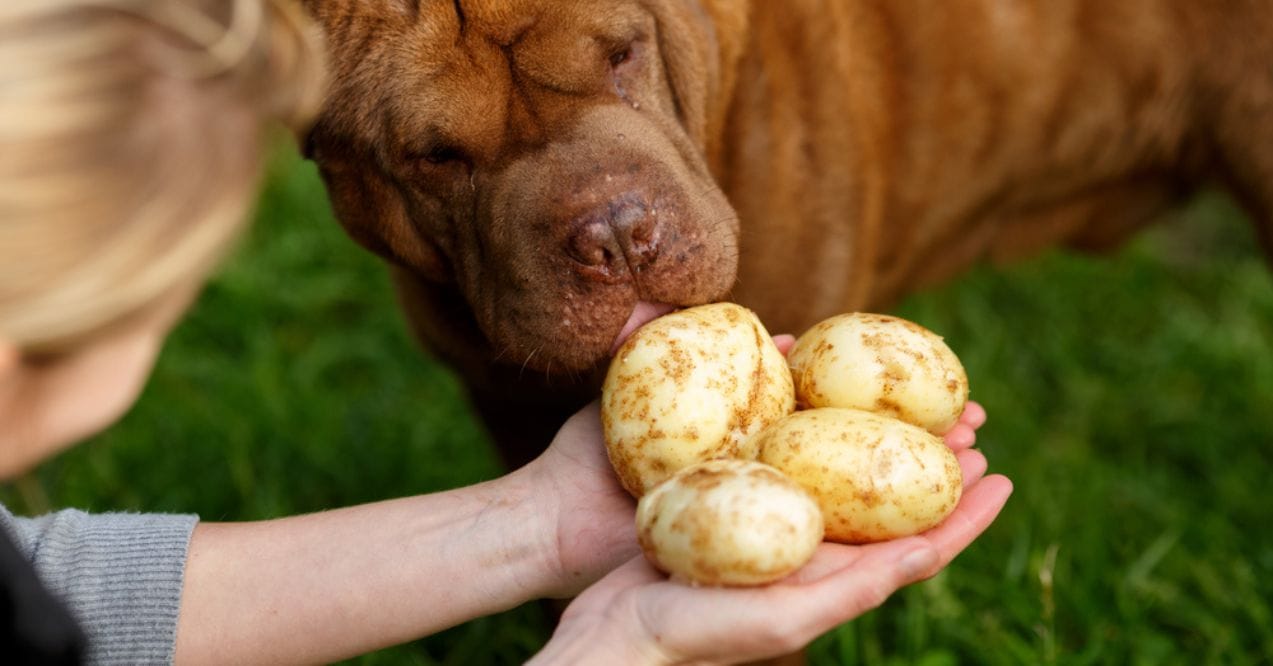The 15 Best Healthy Dog Food Additives
Dog food additives are an excellent way to enhance your furry friend’s diet, providing them with the essential nutrients and variety they need for a vibrant and healthy life. Incorporating these additives into your dog’s meals can promote overall well-being, support joint health, and improve their digestion. Just like humans, dogs benefit from a diverse diet rich in vitamins, minerals, and antioxidants.
Therefore, in this blog post, we’ll explore 15 of the best healthy dog food additives that can make a positive difference in your furry friend’s nutrition. From bone broth to seaweed, these natural additions can revamp your dog’s meals and ensure they get the most out of their food.

What to Add to Dog Food?
Dog food additives offer numerous benefits that can significantly enhance your dog’s vitality and overall health. These nutritious add-ins may support various aspects of your pet’s well-being, including digestive health, skin and coat condition, and immune function, while also improving the taste of their regular food. Here are 15 best additives for dog food:
1. Bone Broth
Bone broth is a nutrient-rich liquid that provides numerous benefits for dogs. Packed with collagen, glucosamine, and chondroitin, this additive supports joint health and mobility. The gelatin in bone broth aids in digestion by helping to repair the gut lining, making it an excellent addition for dogs with sensitive stomachs. Additionally, bone broth is highly hydrating, which is especially beneficial for dogs that don’t drink enough water.
To add bone broth to your dog’s kibble, simply pour a small amount over their dry food. This not only enhances the flavor, making meals more appealing, but also boosts the nutritional profile of their diet. Ensure that the bone broth you use is free from onions, garlic, and excessive salt, as these can be harmful to dogs.
2. Canned Sardines
Canned sardines are also an excellent option for those who wonder what to add to dog food. Packed with omega-3 fatty acids, proteins, and essential vitamins, these nutrients can support skin health, promote a shiny coat, and contribute to joint function. Sardines are also a natural source of calcium, which is important for bone health.
When adding sardines to your dog’s diet, choose varieties packed in water without added salt. For small dogs, a quarter of a sardine may suffice, while larger dogs can handle up to a whole sardine. Introduce this additive gradually and monitor your dog for any digestive changes.
3. Pumpkin

Pumpkin is a versatile dog food additive that can support digestive health due to its high fiber content. This fiber can help regulate bowel movements, potentially alleviating both diarrhea and constipation. Pumpkin is also low in calories and rich in vitamins A and C, making it a nutritious addition to your dog’s diet.
When using pumpkin as a dog food add in, opt for plain, canned pumpkin without added sugars or spices. Start with a teaspoon for small dogs and up to a tablespoon for larger breeds, mixed into their regular food. As with any new food, introduce pumpkin gradually and observe your dog’s response.
4. Cottage Cheese
Cottage cheese is a nutritious and versatile dog food add-in that offers high levels of protein and calcium. These nutrients support heart function, bone health, and the immune system. The protein in cottage cheese helps build and repair muscles, while calcium is essential for strong bones and teeth.
When incorporating cottage cheese into your dog’s diet, start with small amounts to ensure they tolerate it well. You can mix a spoonful into their regular food or use it as a tasty topping. Opt for low-fat or non-fat versions without added salt to keep it healthy.
5. Kefir
Kefir is a probiotic-rich fermented dairy product that may enhance gut health and digestion. It contains beneficial bacteria that promote a healthy balance of gut flora, which can improve digestion and nutrient absorption. Kefir also supports immune function and can help maintain a healthy coat.
To add kefir to your dog’s meals, start with a small amount, such as a teaspoon, and gradually increase it based on your dog’s size and tolerance. You can pour it over their kibble or mix it into wet food. Choose plain, unsweetened kefir without added flavors or sweeteners for the best results.
6. Fresh Vegetables

Fresh vegetables like carrots, celery, and spinach are excellent dog food add ins due to their high nutritional value. They are rich in vitamins, minerals, and fiber, which boost immunity, metabolism, and overall health. Carrots, for example, are high in beta-carotene, which supports vision and immune function, while spinach provides iron and antioxidants.
To prepare vegetables for easy digestion, steam or lightly cook them before adding them to your dog’s food. Chopping them into small, manageable pieces can also help prevent choking and ensure they are easily digestible.
7. Blueberries
Blueberries are an antioxidant-rich superfood that supports immune health, digestion, and brain function. Packed with vitamins C and K, fiber, and antioxidants, these small berries may help fight oxidative stress and promote overall well-being.
You can include blueberries in your dog’s diet by adding a few fresh or frozen berries to their meals. Start with a small amount to see how your dog reacts and gradually increase the portion if they enjoy them. Blueberries make a great occasional treat or a nutritious addition to their regular food.
8. Green Tripe
Green tripe is a highly beneficial dog food add-in, rich in probiotics and enzymes that support gut health and digestion. Its nutritional profile includes essential fatty acids, vitamins, and minerals, which promote a healthy digestive system. The natural probiotics in green tripe can help maintain a balanced gut flora, improving nutrient absorption and overall digestive health.
To incorporate green tripe into your dog’s meals, look for raw or freeze-dried options. Start by adding a small amount to their regular food and gradually increase the portion. Green tripe has a strong odor, so it’s best to mix it well with their food to make it more palatable.
9. Coconut Oil
Coconut oil can be another excellent addition to your dog’s diet for maintaining healthy skin and coat, assisting digestion, and supporting weight management. Its medium-chain triglycerides (MCTs) provide a quick energy source and have anti-inflammatory properties. Coconut oil can also help improve the shine and softness of your dog’s coat and support healthy skin.
To add coconut oil to your dog’s food, start with a small amount, such as a quarter teaspoon for small dogs and a teaspoon for larger dogs. Gradually increase the dosage based on your dog’s size and tolerance. Mix it well into their regular meals to ensure even distribution.
10. Quail Eggs

Quail eggs are a nutrient-dense option that is high in protein and essential vitamins, making them one of the best healthy things to put in dog food. They contain vitamins A, B12, and D, as well as selenium and riboflavin, which support overall health and vitality. Quail eggs can enhance your dog’s diet by providing a high-quality protein source and promoting muscle growth.
To mix quail eggs into your dog’s meals, you can serve them raw or cooked. Start with one egg for small dogs and up to three eggs for larger breeds. Mix them into their regular food or offer them as a separate treat.
11. Spirulina
Spirulina is a blue-green algae rich in protein, vitamins, and minerals, making it a valuable addition to your dog food. Its benefits include boosting the immune system, improving coat health, and providing anti-inflammatory properties. Spirulina is also packed with antioxidants, which help lower oxidative stress and support overall well-being.
To add spirulina to your dog’s diet, use a powdered form and start with a small amount, such as an eighth of a teaspoon for small dogs and a quarter teaspoon for larger dogs. Sprinkle it over their food or mix it into their meals to ensure they receive its nutritional benefits.
12. Turmeric
Turmeric is a powerful spice known for its anti-inflammatory and antioxidant properties, making it one of the valuable things to add to dog food. It may support joint health, improve digestion, and optimize overall immune function. The active compound in turmeric, curcumin, helps reduce pro-inflammatory activity and can provide relief for dogs with joint discomfort.
To safely incorporate turmeric into your dog’s meals, start with a small amount, such as a pinch or an eighth of a teaspoon, and gradually increase it based on your dog’s size and tolerance. Mixing it with a bit of coconut oil or black pepper can enhance its absorption. Ensure it is well-blended into their food to avoid any strong flavors that might be off-putting.
13. Chia Seeds

Chia seeds are also an excellent addition to your dog’s diet, packed with omega-3 fatty acids, fiber, and protein. These tiny seeds support digestive health, improve skin and coat condition, and provide sustained energy. Additionally, their high fiber content helps regulate digestion and can promote a healthy gut.
To add chia seeds to your dog’s food, sprinkle a small amount, such as half a teaspoon for small dogs and up to a teaspoon for larger dogs, over their meals. You can also soak them in water to create a gel-like consistency, making them easier to digest. Ensure the seeds are evenly distributed in their food for optimal benefits.
14. Nutritional Yeast
Nutritional yeast is a nutritious dog food add-in that provides a rich source of B vitamins and protein. It supports skin health, assists digestion, and adds a cheesy flavor that dogs love. This makes it a great option for picky eaters and a healthy way to enhance the taste of their meals.
To incorporate nutritional yeast into your dog’s diet, sprinkle a small amount, such as half a teaspoon, over their food. Gradually increase the portion based on your dog’s size and preference. Make sure to choose a product specifically labeled as safe for pets to avoid any additives that might be harmful.
15. Seaweed
Seaweed is a nutrient-rich additive for dog food, loaded with minerals, vitamins, and antioxidants. It supports thyroid function, aids digestion, and promotes overall health. Seaweed’s high iodine content is particularly beneficial for maintaining a healthy thyroid, which regulates metabolism and energy levels.
When choosing seaweed products for your dog, look for varieties like kelp that are safe and specifically prepared for pet consumption. Start with a small amount, such as a pinch or a quarter teaspoon, and mix it into their food. Gradually increase the portion while monitoring your dog for any adverse reactions.
Conclusion
Dog food additives like bone broth, sardines, coconut oil, and spirulina can greatly enhance your dog’s diet, providing essential nutrients for better digestion, joint health, and skin condition. By incorporating a variety of these natural additives into their meals, you can support their overall well-being and improve the taste of their regular food.
Whether you opt for omega-rich oils, fiber-filled vegetables, or antioxidant-packed berries, these additions can ensure your dog receives a balanced, nutrient-dense diet. Start with small amounts, monitor their response, and gradually adjust based on your dog’s needs.
Adding supplements to your dog’s food can enhance their nutrition, support digestive health, improve skin and coat condition, boost immune function, and add variety, making meals more enjoyable and beneficial for their overall well-being.
To ensure additives are safe for your dog, consult with a vet, start with small amounts, observe for reactions, and choose natural, dog-friendly options like bone broth, pumpkin, and fresh vegetables. Avoid additives with artificial ingredients or preservatives.
Introduce new additives to your dog’s diet gradually, starting with small amounts to monitor tolerance. Mix them into regular food and increase the portion slowly. Always choose natural, pet-safe options and consult your vet if unsure.
Yes, you can give your dog human foods as additives, such as pumpkin, blueberries, and cottage cheese. Ensure they are safe for dogs, prepared appropriately, and given in moderation to enhance their diet and overall health.
Yes, it’s generally safe to give your dog raw eggs occasionally, as they provide protein and nutrients. However, ensure they’re fresh and sourced from reputable suppliers to reduce the risk of bacteria like salmonella.
Advertisement. This site offers health, wellness, fitness and nutritional information and is designed for educational purposes only. You should not rely on this information as a substitute for, nor does it replace, professional medical advice, diagnosis, or treatment. If you have any concerns or questions about your health, you should always consult with a physician or other health-care professional. Do not disregard, avoid or delay obtaining medical or health related advice from your health-care professional because of something you may have read on this site. The use of any information provided on this site is solely at your own risk.




















